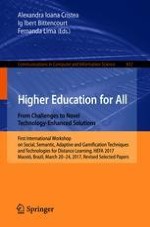2018 | OriginalPaper | Buchkapitel
An Experience with Software Engineering Education Using a Software Process Improvement Game
verfasst von : Daniela C. C. Peixoto, Rodolfo F. Resende, Clarindo Isaías P. S. Pádua
Erschienen in: Higher Education for All. From Challenges to Novel Technology-Enhanced Solutions
Aktivieren Sie unsere intelligente Suche, um passende Fachinhalte oder Patente zu finden.
Wählen Sie Textabschnitte aus um mit Künstlicher Intelligenz passenden Patente zu finden. powered by
Markieren Sie Textabschnitte, um KI-gestützt weitere passende Inhalte zu finden. powered by
